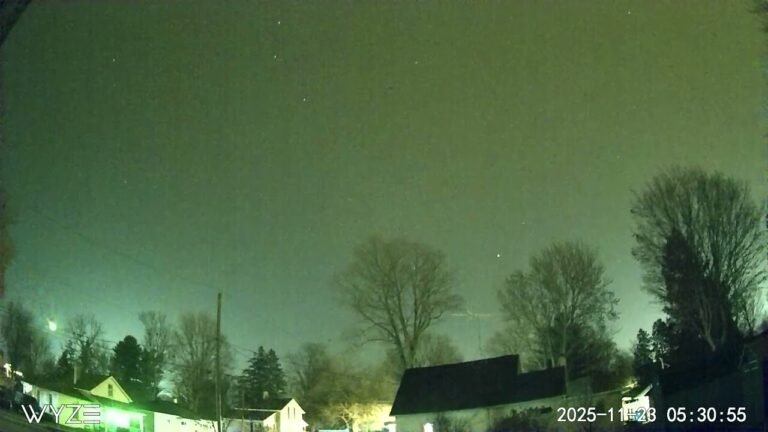A meteor exploded over Michigan’s Great Lakes in a green fireball, videos reveal. The dramatic event was likely caused by a comet fragment burning up in the atmosphere.
On Sunday (Nov. 23) at around 5:29 a.m. ET, dozens of witnesses reported a meteor racing across the sky before exploding in a fiery ball. Cameras set up by the group Michigan Storm Chasers captured the object’s rapid passage and fiery descent, the group revealed in a Facebook post.

Watch On
One video sent to AMS captured the stunning fireball flying through the sky from Coldwater, Michigan, while another video showed the streaking lightshow from Tecumseh, Michigan.
NASA later tracked the meteor’s path using videos and other reports. It became visible 62 miles (100 km) above Hubbard Lake, before racing at 98,500 mph (160,000 km/h) for another 82 miles (132 km) and disintegrating 46 miles (74 km) above Lake Huron, NASA representatives wrote.
The streaking fireball was likely a one-off and not part of a wider shower, such as the ongoing Leonid meteor shower, which runs from Nov. 6 to Nov. 30. Leonid meteors are known for their speed, striking Earth’s atmosphere at about 160,000 mph (260,000 km/h). This velocity often produces bright meteors, or fireballs, some of which leave persistent trails. “This event appears to have been caused by a small comet fragment and was not part of any currently active meteor shower,” NASA representatives wrote.
Most comets and meteors can be seen with the naked eye, but photographing them requires a good set of astrophotography equipment.

Watch On
Fireball meteors sometimes give off a green color due to a high concentration of metals such as nickel, while faster meteoroids also typically produce more vivid colors, according to AMS. Other elements can create different-colored fireballs — for example, sodium produces a bright yellow color while magnesium appears as blue-white, according to AMS.
Similar green colors have been given off by other fireball meteors. For example, in July 2022, a green fireball was spotted above New Zealand, and in November 2022, another one crashed into Lake Ontario. The Ontario fireball was the smallest asteroid ever recorded in space, at just 16 to 24 inches (40 to 60 centimeters) wide.


